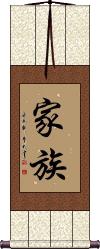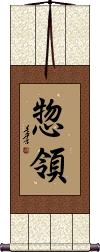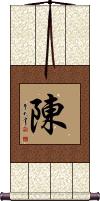Many custom options...
And formats...

Clan in Chinese / Japanese...
Buy a Clan calligraphy wall scroll here!
Personalize your custom “Clan” project by clicking the button next to your favorite “Clan” title below...
Tom Clan Generational Poem
爾昌友延嗣捷開文裔光宗傳世澤遠晉本立道隆積善家國重學業廣成芳 is the Tom Clan Generational Poem.
If you are interested in this poem, you probably already know the meaning, so for now we'll forgo including a translation.
Heike Star / Betelgeuse
平家星 is the old Japanese title for the Betelgeuse star in the constellation Orion.
While also known as Alpha Orionis or Betelgeuse in the West, this was the “Heike star” in Japan.
The powerful Taira clan, known colloquially as the 平家 (Heike clan), adopted this star's red color as its symbol sometime in the late 800s AD. They called the star 平家星 (Heike-boshi).
Family / Members of a Family
家族 is family in Japanese Kanji, Chinese and Korean.
This represents all the members of a family.
This can also mean household or clan, depending on the context.
First Born
Chen / Chan / Yo / Jin
Surname
This is the most common character for a Chinese surname that romanizes as “Chen.”
This is also a surname You or Yo in Japanese, though it can also be pronounced as Chin in Japanese.
In Korean, it is a surname romanized as Jin.
As a word, this character means: to lay out; to exhibit; to display; to narrate; to state; to explain; to tell.
The Chen clan or family was a small kingdom from 1046 BC to 479 BC. It was one of 12 small-but-powerful vassal states during the Spring and Autumn Period 770-475 BC. This name reappeared as the Chen Dynasty (陳朝) of the Southern dynasties from 557 AD to 589 AD.
These search terms might be related to Clan:
Family / Home
Family / Household
Family / Members of a Family
Family and Friends
Family Bond / Family Ties
Family Love
Family Love / Domestic Bliss
Family Over Everything
Forever Family
Happy Family
Human Race / Humanity / Mankind
Jew / Jewish People
One Family Under Heaven
People’s Livelihood and Welfare
Safety and Well-Being of the Family
The Mysterious Bond Between People
When Three People Gather, One Becomes a Teacher
When Three People Gather, Wisdom is Multiplied
Not the results for clan that you were looking for?
Below are some entries from our dictionary that may match your clan search...
| Characters If shown, 2nd row is Simp. Chinese |
Pronunciation Romanization |
Simple Dictionary Definition |
家族 see styles |
jiā zú jia1 zu2 chia tsu kazoku かぞく |
More info & calligraphy: Family / Members of a Familyfamily |
惣領 see styles |
souryou / soryo そうりょう |
More info & calligraphy: First Born |
釋迦牟尼 释迦牟尼 see styles |
shì jiā móu ní shi4 jia1 mou2 ni2 shih chia mou ni Shakamuni |
More info & calligraphy: Shakyamuni / The Buddha釋迦文 (釋迦文尼); 釋伽文 Śākyamuni, the saint of the Śākya tribe. muni is saint, holy man, sage, ascetic monk; it is: intp. as 仁 benevolent, charitable, kind, also as 寂默 one who dwells in seclusion. After '500 or 550' previous incarnations, Śākyamuni finally attained to the state of Bodhisattva, was born in the Tuṣita heaven, and descended as a white elephant, through her right side, into the womb of the immaculate Māyā, the purest woman on earth; this was on the 8th day of the 4th month; next year on the 8th day of the 2nd month he was born from her right side painlessly as she stood under a tree in the Lumbinī garden. For the subsequent miraculous events v. Eitel. also the 神通遊戲經 (Lalitavistara), the 釋迦如來成道記, etc. Simpler statements say that he was born the son of Śuddhodana, of the kṣatriya caste, ruler of Kapilavastu, and Māyā his wife; that Māyā died seven days later, leaving him to be brought up by her sister Prājapati; that in due course he was married to Yaśodharā who bore him a son, Rāhula; that in search of truth he left home, became an ascetic, severely disciplined himself, and finally at 35 years of age, under a tree, realized that the way of release from the chain of rebirth and death lay not in asceticism but in moral purity; this he explained first in his four dogmas, v. 四諦 and eightfold noble way 八正道, later amplified and developed in many sermons. He founded his community on the basis of poverty, chastity, and insight or meditation, ad it became known as Buddhism, as he became known as Buddha, the enlightened. His death was probably in or near 487 B.C., a few years before that of Confucius in 479. The sacerdotal name of his family is Gautama, said to be the original name of the whole clan, Śākya being that of his branch, v. 瞿, 喬.; his personal name was Siddhārtha, or Sarvārthasiddha, v. 悉. |
堂 see styles |
táng tang2 t`ang tang douzaki / dozaki どうざき |
(main) hall; large room for a specific purpose; CL:間|间[jian1]; relationship between cousins etc on the paternal side of a family; of the same clan; classifier for classes, lectures etc; classifier for sets of furniture (n,n-suf) (1) temple; shrine; chapel; (n,n-suf) (2) hall; (suffix) (3) (suffix used in company names, store names, etc.) company; (n,n-suf,n-pref) (4) (archaism) (See 表座敷) front room; (surname) Dōzaki prāsāda. A hall, temple, court. |
宗 see styles |
zōng zong1 tsung motoi もとい |
school; sect; purpose; model; ancestor; clan; to take as one's model (in academic or artistic work); classifier for batches, items, cases (medical or legal), reservoirs (1) (rare) origin; source; (2) (rare) virtuous ancestor; (given name) Motoi Ancestors, ancestral; clan; class, category. kind; school, sect; siddhānta, summary, main doctrine, syllogism, proposition, conclusion, realization. Sects are of two kinds: (1) those founded on principles having historic continuity, as the twenty sects of the Hīnayāna, the thirteen sects of China, and the fourteen sects of Japan: (2) those arising from an individual interpretation of the general teaching of Buddhism, as the sub-sects founded by Yongming 永明 (d. 975), 法相宗, 法性宗, 破相宗, or those based on a peculiar interpretation of one of the recognized sects, as the Jōdo-shinshū 淨土眞宗 found by Shinran-shōnin. There are also divisions of five, six, and ten, which have reference to specific doctrinal differences. Cf. 宗派. |
室 see styles |
shì shi4 shih muroran むろらん |
room; work unit; grave; scabbard; family or clan; one of the 28 constellations of Chinese astronomy greenhouse; icehouse; cellar; (personal name) Muroran House, household, abode; translit. ś, s, śr;, śl. Cf. 尸; 舍; 音; for 室摩 v. 沙門. |
族 see styles |
zú zu2 tsu yakara やから |
race; nationality; ethnicity; clan; by extension, social group (e.g. office workers 上班族) (n,n-suf) (1) tribe; clan; band; family; (n,n-suf) (2) (ぞく only) (taxonomical) tribe; (n,n-suf) (3) (ぞく only) group (of the periodic table); (female given name) Yakara clan |
曹 see styles |
cáo cao2 ts`ao tsao tsukasa つかさ |
class or grade; generation; plaintiff and defendant (old); government department (old) (1) (obsolete) (See 曹司・ぞうし・1) palace room for government officials; (2) (obsolete) fellow; set (of people); clan; family; (surname) Tsukasa Company, class; used as the plural of pronouns, etc. |
氏 see styles |
zhī zhi1 chih hamauji はまうじ |
see 月氏[Yue4 zhi1] and 閼氏|阏氏[yan1 zhi1] (suffix) (1) (honorific or respectful language) Mr; Mrs; Ms; Miss; (n,suf) (2) clan; (pronoun) (3) (honorific or respectful language) he; him; (counter) (4) (honorific or respectful language) counter for people; (surname) Hamauji |
社 see styles |
shè she4 she yashiro やしろ |
(bound form) society; organization; agency; (old) god of the land (Shinto) shrine; (p,s,f) Yashiro Gods of the land; a village, clan, society. |
閥 阀 see styles |
fá fa2 fa isao いさを |
powerful individual, family or group; clique; (loanword) valve (n,n-suf) clique; clan; faction; (personal name) Isao; Isawo |
一味 see styles |
yī wèi yi1 wei4 i wei kazumi かずみ |
persistently; stubbornly; blindly (1) clan; partisans; conspirators; gang; ring; crew; (n,vs,vi) (2) participation (e.g. in a plot); (3) one flavour; one charm; (4) one ingredient (in traditional Chinese medicine); (5) {Buddh} universality (of the teachings of Buddha); (given name) Kazumi One, or the same flavour, kind or character, i.e. the Buddha's teaching. |
一族 see styles |
yī zú yi1 zu2 i tsu ichizoku いちぞく |
social group; subculture; family; clan; see also 族[zu2] (1) family; relatives; dependents; (2) household |
一門 一门 see styles |
yī mén yi1 men2 i men hitokado ひとかど |
(1) family; clan; kin; (2) sect; school; adherents; followers; disciples; (3) {sumo} group of related sumo stables; (surname) Hitokado The one door out of mortality into nirvāṇa, i.e. the Pure-land door. |
上忍 see styles |
shàng rěn shang4 ren3 shang jen jounin / jonin じょうにん |
Ninja clan master; highest-ranking ninja exceedingly patient |
八憍 see styles |
bā jiāo ba1 jiao1 pa chiao hakkyō |
The eight kinds of pride, or arrogance, resulting in domineering: because of strength; of clan, or name; of wealth; of independence, or position; of years, or age; of cleverness, or wisdom; of good or charitable deeds; of good looks. Of these, eight birds are named as types: 鴟梟 two kinds of owl, eagle, vulture, crow, magpie, pigeon, wagtail. |
八覺 八觉 see styles |
bā jué ba1 jue2 pa chüeh hachikaku |
The eight (wrong) perceptions or thoughts, i.e. desire; hate; vexation (with others); 親里 home-sickness; patriotism (or thoughts of the country's welfare); dislike of death; ambition for one's clan or family; slighting or being rude to others. 華嚴經 13. |
勢族 势族 see styles |
shì zú shi4 zu2 shih tsu |
influential family; powerful clan |
單傳 单传 see styles |
dān chuán dan1 chuan2 tan ch`uan tan chuan tanden |
to have only one heir in a generation (of a family, clan etc); to be learned from only one master (of a skill, art etc) direct transmission |
四姓 see styles |
sì xìng si4 xing4 ssu hsing shisei; shishou / shise; shisho しせい; ししょう |
(1) the four Hindu castes; (2) (hist) the four great families of the Heian period (esp. the Minamoto clan, the Taira clan, the Fujiwara clan and the Tachibana clan) The four Indian 'clans' or castes— brāhmaṇa, kṣatriya, vaiśya, and śūdra, i. e. (1) priestly, (2) military and ruling, (3) farmers and traders, and (4) serfs; born respectively from the mouth, shoulders, flanks, and feet of Brahma. |
土豪 see styles |
tǔ háo tu3 hao2 t`u hao tu hao dogou / dogo どごう |
local tyrant; local strong man; (slang) nouveau riche powerful local clan; local strongman; (surname) Dogou |
大族 see styles |
dà zú da4 zu2 ta tsu |
large and influential family; clan |
宗主 see styles |
zōng zhǔ zong1 zhu3 tsung chu soushu / soshu そうしゅ |
head of a clan; natural leader; person of prestige and authority in a domain; suzerain suzerain |
宗室 see styles |
zōng shì zong1 shi4 tsung shih soushitsu / soshitsu そうしつ |
imperial clan; member of the imperial clan; clansman; ancestral shrine (given name) Soushitsu |
宗族 see styles |
zōng zú zong1 zu2 tsung tsu souzoku / sozoku そうぞく |
clan; clansman one's family or clan clan |
宗正 see styles |
zōng zhèng zong1 zheng4 tsung cheng yahiro やひろ |
Director of the Imperial Clan in imperial China, one of the Nine Ministers 九卿[jiu3 qing1] (surname) Yahiro |
宗法 see styles |
zōng fǎ zong1 fa3 tsung fa souhou / soho そうほう |
patriarchal clan system (hist) regulations governing Chinese religious observances and social order; (place-name) Souhou 宗體 The thesis of a syllogism consisting of two terms, each of which has five different names: 自性 subject; 差別 its differentiation; 有法 that which acts; 法 the action; 所別 that which is differentiated; 能別 that which differentiates; 前陳 first statement; 後陳 following statement; 宗依 that on which the syllogism depends, both for subject and predicate. |
宗祠 see styles |
zōng cí zong1 ci2 tsung tz`u tsung tzu |
ancestral temple; clan hall |
家家 see styles |
jiā jiā jia1 jia1 chia chia keke いえいえ |
each house; every house; many houses one who goes from clan to clan |
家門 家门 see styles |
jiā mén jia1 men2 chia men kamon かもん |
house door; family clan one's family; one's clan; (given name) Kamon |
Click here for more clan results from our dictionary
The following table may be helpful for those studying Chinese or Japanese...
| Title | Characters | Romaji (Romanized Japanese) | Various forms of Romanized Chinese | |
| Tom Clan Generational Poem | 爾昌友延嗣捷開文裔光宗傳世澤遠晉本立道隆積善家國重學業廣成芳 尔昌友延嗣捷开文裔光宗传世泽远晋本立道隆积善家国重学业广成芳 | ěr chāng yǒu yán sì jié kāi wén yì guāng zōng chuán shì zé yuǎn jìn běn lì dào lóng jī shàn jiā guó zhòng xué yè guǎng chéng fāng er3 chang1 you3 yan2 si4 jie2 kai1 wen2 yi4 guang1 zong1 chuan2 shi4 ze2 yuan3 jin4 ben3 li4 dao4 long2 ji1 shan4 jia1 guo2 zhong4 xue2 ye4 guang3 cheng2 fang1 er chang you yan si jie kai wen yi guang zong chuan shi ze yuan jin ben li dao long ji shan jia guo zhong xue ye guang cheng fang | erh ch`ang yu yen ssu chieh k`ai wen i kuang tsung ch`uan shih tse yüan chin pen li tao lung chi shan chia kuo chung hsüeh yeh kuang ch`eng fang erh chang yu yen ssu chieh kai wen i kuang tsung chuan shih tse yüan chin pen li tao lung chi shan chia kuo chung hsüeh yeh kuang cheng fang |
|
| Heike Star Betelgeuse | 平家星 | hei ke boshi heikeboshi | ||
| Family Members of a Family | 家族 | ka zoku / kazoku | jiā zú / jia1 zu2 / jia zu / jiazu | chia tsu / chiatsu |
| First Born | 惣領 | souryou / soryo | ||
| Chen Chan Yo Jin | 陳 陈 | chin | chén / chen2 / chen | ch`en / chen |
| In some entries above you will see that characters have different versions above and below a line. In these cases, the characters above the line are Traditional Chinese, while the ones below are Simplified Chinese. | ||||
Successful Chinese Character and Japanese Kanji calligraphy searches within the last few hours...








